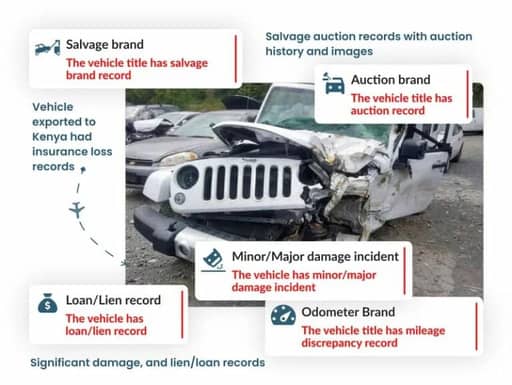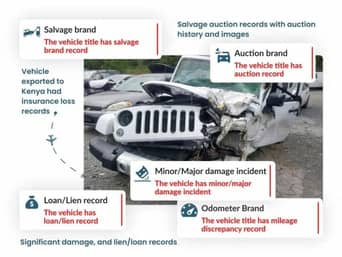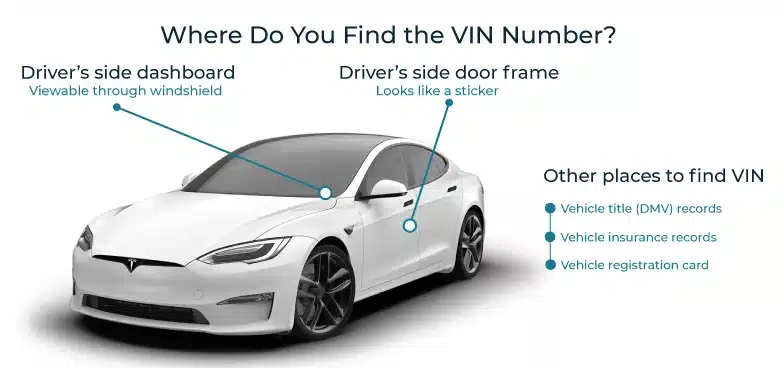Chassis Number Check Kenya
Many unsafe, false “clean” and damaged vehicles from the US easily find a second life in African countries like Kenya. Run a VIN check Kenya to verify the history of any used vehicle before purchasing.
Save Thousands with a Kenya VIN Check


- Vehicle had an accident history with significant damage
- Salvage title with auction history and images
- Lien records and odometer rollback issues
Why Running a Kenya VIN Check is Crucial
What is a Kenya Chassis Number Check?
A chassis number, also known as a VIN (Vehicle Identification Number), is a unique 17-character code that identifies every vehicle. It is useful for verifying specifications and checking the history.
In Kenya, a VIN number check is important to verify authenticity and detect potential fraud when purchasing a used car, especially imports from the U.S..
The VIN can be found on the dashboard near the windshield, inside the driver-side door frame, or on the engine block. A thorough chassis number check helps buyers avoid stolen or damaged vehicles.
What’s Included in a Kenya VIN Check Report?
Thousands of used cars from the U.S. arrive in Kenya annually, with some having hidden accident histories or fraud issues. A chassis number check report reveals the following crucial details, protecting buyers from costly mistakes.
Accident Records
A VIN check uncovers reported accidents, highlighting damages sustained before exportation. Buyers can assess structural integrity and repair quality, ensuring they don’t purchase unsafe vehicles.
Salvage Title Check
Some imported cars have salvage titles, meaning they were deemed too damaged by insurers. A VIN report helps avoid these vehicles, which may have undisclosed issues affecting long-term reliability.
Auction and Sales Records
VIN checks provide historical auction data, revealing prior sale prices, conditions, and images (up to 10), helping buyers evaluate market value and authenticity.
Stolen Record Check
A VIN check flags stolen vehicles before purchase. Many stolen cars are exported illegally, and buyers risk legal trouble if they unknowingly acquire one.
Odometer Rollback Check
Mileage fraud is common in second-hand cars from U.S. auctions. A VIN check ensures buyers get accurate mileage readings, preventing deceptive resale practices.
Flood Damage Records
U.S. vehicles affected by hurricanes often end up in Kenya’s market. A VIN report helps identify flood-damaged cars that may develop mechanical issues over time.
Use Case: Why Kenya VIN Check Matters?
This is a case of a used car buyer who spent a few dollars on a VIN check to save thousands in unexpected repairs and maintenance.
Car Listing Overview
- The car in excellent condition
- Ready for the road
- Enticing photos, with clean interiors
- A competitive price tag
Key Findings
- Accident record
- lien/loan record
- Damage record
- Auction history with damaged car images
- Title brands - odometer rollback and salvage title
Outcome
- Car unsafe to drive
- Difficult to insure.
- Potential repossession due to unresolved liens
- Worth significantly less than advertised.
Lesson Learnt
- Clean-looking cars can hide a troubled past
- Photos don’t lie
- VIN check exposes hidden issues
- Never rely on car listing description only.
Benefits of a VIN Check in Kenya
With thousands of used cars imported from the U.S. yearly, many have hidden risks. Online chassis number check Kenya empowers buyers with crucial insights before making a purchase.
Check Flood Damage History
Alerts buyers to flood-damaged vehicles that may have electrical and mechanical failures down the line.
Avoid Buying Stolen Cars
A VIN check Kenya prevents buyers from unknowingly purchasing stolen cars, reducing legal risks and ensuring ownership legitimacy.
Detect Hidden Accidents
Identifies past collisions, allowing buyers to assess whether a car has been properly repaired or still poses safety risks.
Verify Mileage Accuracy
Protects against fraudulent odometer rollbacks, ensuring buyers receive a vehicle with a genuine usage history.
Assess Market Value
Auction and sales history help buyers determine fair pricing and avoid overpriced or undervalued purchases.
Confirm Ownership Status
Ensures the car isn’t linked to outstanding lien or criminal activity, providing peace of mind during transactions.
Customer Testimonials
After a struggle to find a website that I can check a car’s information via a VIN number, I came across this website, and it helped me to pull out the car’s information of the car I wanted to buy via VIN number, They are very helpful, I do recommend this website to everyone.
Given Vusi Sibiya (SA)
Honestly, this website worked better than I expected! I took the gamble at purchasing a one time report, and was absolutely able to download the window sticker that I was looking for.
Now knowing that this exists, I will certainly be returning!
Russ Snediker (US)
This is the most accurate source for any vehicle information that I have ever used. They are the best when it comes to customer service and satisfaction, and the live chat agent Richard was very knowledgeable about the site and guided me through it perfectly without hesitation… See more
Lary Robertson (US)
Our Vehicle Check Tools
Looking for a different solution? One of these tools might be the answer.
FAQ About Online Chassis Number Check Kenya
How to check the owner of a car in Kenya?
Search for a vehicle owner in Kenya using mVerified via NTSA eCITIZEN. Receive ownership details by SMS and email, including a Copy of Records (CoR). For a used car shipped from the US to Kenya, you can look up the ownership history and other vital records like accidents, lien, theft, damage and more using our chassis number check kenya tool.
Can I get a chassis number check online?
Yes. Simply the affordable VIN check Kenya tool provided by Detailed Vehicle History. It is an affordable and best carfax alternative to verify accident history, title records, theft checks, odometer rollback, and more.
What is the VIN number check in Kenya?
A VIN check reveals whether a vehicle has a clean title or one with hidden issues. A used car might have several branded titles like write-off, salvage, rebuilt, or declared junk by an insurance company, thus emphasizing the need to run a VIN number check.
How to check vehicle details by chassis number?
To check a vehicle’s details using the chassis number (VIN), you can use online VIN decoder tools like the Detailed Vehicle History
What can a chassis number tell you?
A chassis number (VIN) is a unique number to identify a certain vehicle. It is important to check the vehicle’s specifications (year, make, model, engine, assembly plant, and the country of origin) and crucial records like accident history, auction history, and more.
Run a VIN Check Before Buying a Used Car in Kenya
Get your comprehensive vehicle history report now


